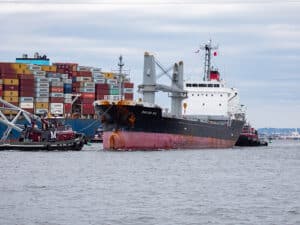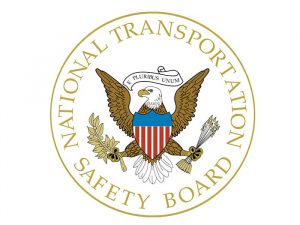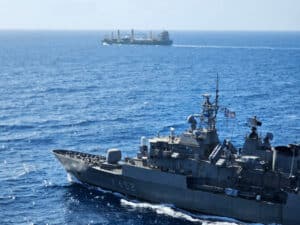
Russia pulls out of Black Sea Grain Initiative
Written by Nick Blenkey
Cargo inspections under Black Sea Grain Initiative[ UN photo]
Wheat, corn and soybean prices all rose today on the news that Russia has not extended its participation in the UN sponsored Black Sea Grain Initiative. With Russia no longer on board, the initiative ended today, although there are still hopes that it could be resurrected.
The first shipment of grain under the agreement departed the Port of Odesa, August 1, 2022. As of Friday, June 15, says the office of the UN coordinator for initiative, a total of 32.8 million tons of grain and foodstuffs had been exported from the three designated under the Initiative. Ships made 1,003 voyages from the ports, including 35 that had been stranded since February 2022. With the decision on renewal approaching there was only vessel remaining under the initiative, which loading cargo in Odesa.
Russian state controlled news agency TASS says: “On July 17, Moscow officially notified Ankara, Kiev, as well as the UN Secretariat, that it objected to the grain deal’s extension. According to Kremlin Spokesman Dmitry Peskov, ‘the Black Sea agreements have ceased to be valid.’”
Russia can resurrect the grain initiative as soon as its conditions are met, says TASS.
“The agreements on food exports from Ukraine were concluded last July and extended three times: for 120 days in November and then for two months both in March and May,” says TASS. “The Russian side reduced the effective term of the agreement due to a number of requirements being unfulfilled, including the lifting of sanctions on the Russian Agricultural Bank and fertilizer producers. During this time, the deal’s participants planned to make progress in implementing the memorandum.”
In a subsequent post TASS quotes Kremlin Spokesman Peskov as saying that that Russia would immediately return to the implementation of the Black Sea agreements as soon as the Russian part of the grain deal is fulfilled.
UN SECRETARY GENERAL STATEMENT
UN Secretary General Antonio Guteriez spelled out the steps that the UN has taken to meet Russian requirements in a lengthy statement in which he noted that with the decision to terminate the Black Sea Initiative, the Russian Federation also terminated its commitment to “facilitate the unimpeded export of food, sunflower oil, and fertilizers from Ukrainian controlled Black Sea Ports.”
“Ultimately, participation in these agreements is a choice,” said the Secretary General. “But struggling people everywhere and developing countries don’t have a choice.”
“I am aware of some obstacles that remained in the foreign trade of Russian food and fertilizer products,” said the statement. “This is precisely why I sent a letter to President Putin with a new proposal to keep the Black Sea Initiative alive.”
“In that letter – which I believe is necessary to quote at length – I underlined that:
“Since the signing of the Memorandum of Understanding, and also taking into account the measures adopted by the Russian Federation, Russian grain trade has reached high export volumes and fertilizer markets are stabilizing with Russian exports nearing full recovery, as stated by the Russian Union of Grain Exporters and Russian Fertilizer Producers Association.”
“The letter went on to detail action by the United Nations.
“Namely that we have: also delivered breakthroughs even in some of the most challenging areas of trade facilitation. The United Nations has helped to secure the issuance of: U.S. General License 6B and 6C, which are especially important in light of the extraterritorial nature of U.S. sanctions as these licenses apply not only to US imports from the Russian Federation but also to all countries concerned with their sanctions regime; two U.K. General Licenses on finance and trade in food and fertilizers, which are especially important for the insurance market; and the derogation by the European Union in its ninth sanctions package, which allowed, for example, the unfreezing of assets of fertilizer companies, as well as a range of clarifications, Frequently Asked Questions, fact sheets and other guidance to the private sector.
“These regulatory frameworks, as well as extensive engagement with the private sector to find dedicated solutions across banking and insurance sectors have led to the progressive normalization of trading conditions since July 2022, including declining freight and insurance rates. Bulk vessel port calls at Russian ports have also remained mostly steady.”
“The letter went on to detail how: “We have built a bespoke payments mechanism for the Russian Agricultural Bank through JP Morgan outside of SWIFT.”
“The letter also described how: ‘The United Nations also has worked closely with the key Russian fertilizer groups to unblock assets … amounting to over 70 per cent of the frozen assets in the original list submitted to us by the Russian Federation in November 2022. Moreover, the United Nations has facilitated… the humanitarian donations of fertilizer to most in-need countries in Africa – overcoming profound complexities of the operation.’
“My letter also mentioned that: “the Russian Federation has highlighted the issue of access to SWIFT by the Russian Agricultural Bank as a key factor influencing its decisions. On this front, the United Nations recently brokered a concrete proposal to enable a subsidiary of the Russian Agricultural Bank to regain access to SWIFT with the European Commission. The key element underpinning this proposal’s political viability is that it can be implemented within existing regulations. We see this as a unique political opening, stemming from a genuine desire to protect global food security beyond 17 July.”




